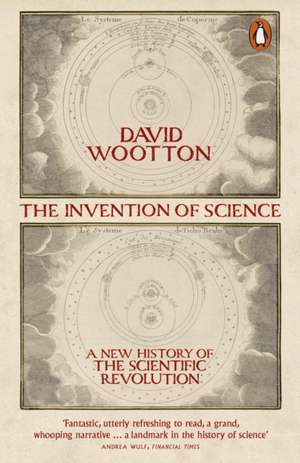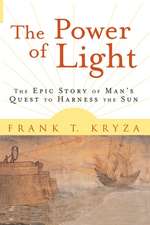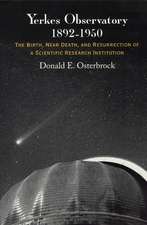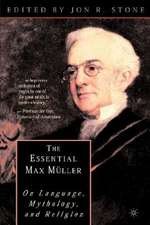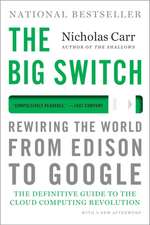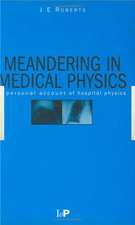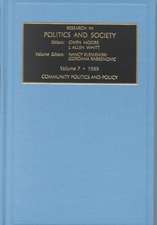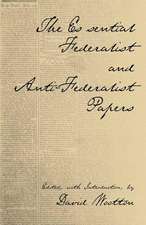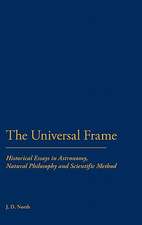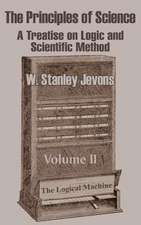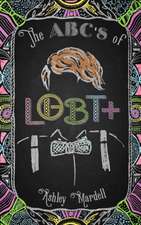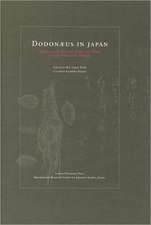The Invention of Science: A New History of the Scientific Revolution
Autor David Woottonen Limba Engleză Paperback – 28 sep 2016
Before 1492 it was assumed that all significant knowledge was already available; there was no concept of progress; people looked for understanding to the past not the future. This book argues that the discovery of America demonstrated that new knowledge was possible: indeed it introduced the very concept of 'discovery', and opened the way to the invention of science.
The first crucial discovery was Tycho Brahe's nova of 1572: proof that there could be change in the heavens. The telescope (1610) rendered the old astronomy obsolete. Torricelli's experiment with the vacuum (1643) led directly to the triumph of the experimental method in the Royal Society of Boyle and Newton. By 1750 Newtonianism was being celebrated throughout Europe.
The new science did not consist simply of new discoveries, or new methods. It relied on a new understanding of what knowledge might be, and with this came a new language: discovery, progress, facts, experiments, hypotheses, theories, laws of nature - almost all these terms existed before 1492, but their meanings were radically transformed so they became tools with which to think scientifically. We all now speak this language of science, which was invented during the Scientific Revolution.
The new culture had its martyrs (Bruno, Galileo), its heroes (Kepler, Boyle), its propagandists (Voltaire, Diderot), and its patient labourers (Gilbert, Hooke). It led to a new rationalism, killing off alchemy, astrology, and belief in witchcraft. It led to the invention of the steam engine and to the first Industrial Revolution. David Wootton's landmark book changes our understanding of how this great transformation came about, and of what science is.
Preț: 104.04 lei
Preț vechi: 122.29 lei
-15% Nou
Puncte Express: 156
Preț estimativ în valută:
19.91€ • 21.64$ • 16.74£
19.91€ • 21.64$ • 16.74£
Carte disponibilă
Livrare economică 04-15 aprilie
Livrare express 15-21 martie pentru 51.27 lei
Preluare comenzi: 021 569.72.76
Specificații
ISBN-13: 9780141040837
ISBN-10: 0141040831
Pagini: 784
Ilustrații: 16pp colour illustrations
Dimensiuni: 133 x 199 x 36 mm
Greutate: 0.56 kg
Editura: Penguin Books
Colecția Penguin
Locul publicării:London, United Kingdom
ISBN-10: 0141040831
Pagini: 784
Ilustrații: 16pp colour illustrations
Dimensiuni: 133 x 199 x 36 mm
Greutate: 0.56 kg
Editura: Penguin Books
Colecția Penguin
Locul publicării:London, United Kingdom
Notă biografică
David
Wootton
is
Anniversary
Professor
of
History
at
the
University
of
York.
His
previous
books
includePaolo
Sarpi(1983),
Bad
Medicine(2006)
andGalileo(2010).
He
has
given
the
Raleigh
Lecture
at
the
British
Academy
(2008),
the
Carlyle
Lectures
at
Oxford
(2014)
and
the
Benedict
Lectures
at
Boston
(2014).
Recenzii
The
seventeenth
century
saw
the
emergence
of
the
mindset
that
characterizes
modern
science.
David
Wootton
lucidly
describes
the
individuals,
the
experiments
and
the
controversies
that
marked
this
intellectually
turbulent
and
transformative
era.
...
This
fascinating
and
scholarly
book
should
receive
a
wide
readership.
This is a superb book, at once cogent, revisionist and profound. It offers the most novel and significant account of the Scientific Revolution to appear for many years ... it is simply rather brilliant.
A truly remarkable piece of scholarship. His work has an ingenious and innovative linguistic foundation, examining the invention and redefinition of words as tracers of a new understanding of nature and how to approach it. His erudition is awesome, and his argument is convincing.
A grand, whooping narrative that is also exhaustively researched. It will, I am certain, become a landmark in the discipline of the history of science.
This is a superb book, at once cogent, revisionist and profound. It offers the most novel and significant account of the Scientific Revolution to appear for many years ... it is simply rather brilliant.
A truly remarkable piece of scholarship. His work has an ingenious and innovative linguistic foundation, examining the invention and redefinition of words as tracers of a new understanding of nature and how to approach it. His erudition is awesome, and his argument is convincing.
A grand, whooping narrative that is also exhaustively researched. It will, I am certain, become a landmark in the discipline of the history of science.
